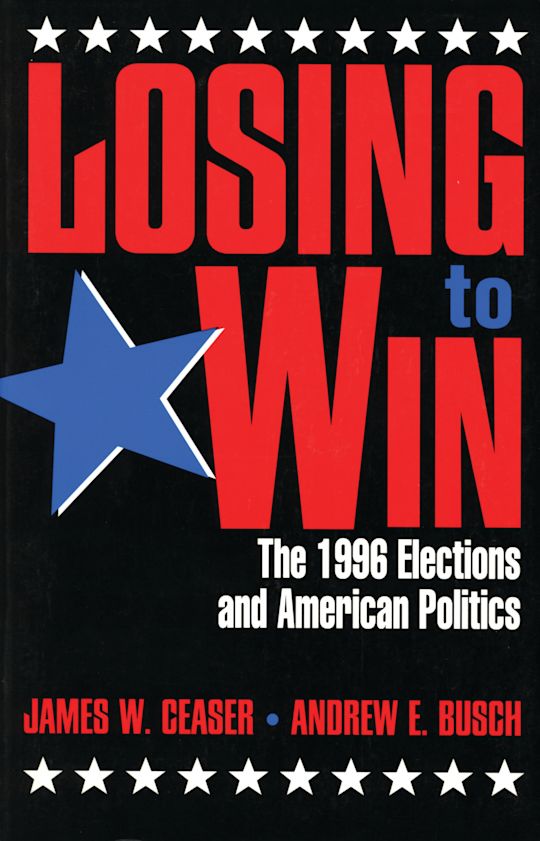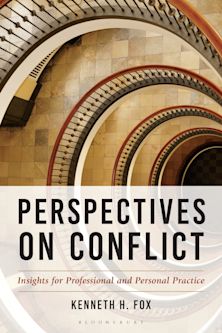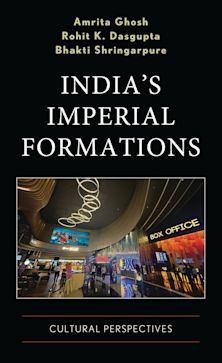- Home
- ACADEMIC
- Politics & International Relations
- Politics - Other
- Losing to Win
Losing to Win
The 1996 Elections and American Politics
- Textbook
Losing to Win
The 1996 Elections and American Politics
- Textbook
For information on how we process your data, read our Privacy Policy
Thank you. We will email you when this book is available to order
Buy from Bloomsbury eTextBooks
You are now leaving the Bloomsbury Publishing website. Your eBook purchase will be with our partner https://www.vitalsource.com.
Your credit card statement will show this purchase originating from VitalSource Technologies. They will also provide any technical assistance you might require.
You must sign in to add this item to your wishlist. Please sign in or create an account
Description
With the publication of the highly regarded Upside Down and Inside Out: The 1992 Elections and American Politics, James Ceaser and Andrew Busch established themselves as top authorities on the study of national elections and their broader implications for American politics and society. Losing To Win:The 1996 Elections and American Politics presents Ceaser and Busch's groundbreaking research of electoral politics and continues their penetrating discussions of divided government, independent candidates, party platforms, realignment theory, "outsiderism," and campaign strategies. By separating myth from fact in presidential contests and by emphasizing the significance of frequently overlooked issues, such as foreign policy, this book is essential reading for courses in American Government, Campaigns and Elections, and Presidential Politics, as well as for any American interested in the real and lasting importance of the 1996 elections.
Table of Contents
Chapter 2 Greater Dooms Win Greater Destinies
Chapter 3 The Two Clinton Presidencies
Chapter 4 The Republican Nomination
Chapter 5 In the Doledrums: The Interregnum from March to September
Chapter 6 The Congressional Elections
Chapter 7 The Presidential Election and the New Era of Coalitional Partnership
Chapter 8 Appendix: Presidential Vote by State, 1996
Chapter 9 Index
Chapter 10 About the Authors
Product details
| Published | 20 Mar 1997 |
|---|---|
| Format | Ebook (Epub & Mobi) |
| Edition | 1st |
| Extent | 200 |
| ISBN | 9781461704720 |
| Imprint | Rowman & Littlefield Publishers |
| Series | Studies in American Political Institutions and Public Policy |
| Publisher | Bloomsbury Publishing |
About the contributors
Reviews
-
This impressive new book combines historical perspectives and scholarly savvy with a detailed factual grasp of the '96 elections. A variety of novel and provocative insights and observations about the latest American political experience emerges from the mix.
Bruce Buchanan, University of Texas, Austin
-
Losing to Win is a tour de force analysis of contemporary American politics and the logical place to begin any retrospective consideration of the 1996 elections. It is a must read for professionals interested in the republic's latest exercises indemocracy and should command a wider audience as well....
F. Alan Coombs, University of Utah
-
. . . excellent analyses especially valuabe contributions to electoral scholarship and citizen understanding. . . . highly recommened for all libraries.
Choice Reviews
-
The fabric of Losing to Win is tightly woven and amazingly comprehensive in its coverage... Losing to Win is a tour de force analysis of contemporary American politics and the logical place to begin any retrospective consideration of the 1996 elections.
F. Alan Coombs, University of Utah, H-Net: Humanities and Social Science Reviews Online
-
James Ceaser and Andrew Busch have written not only an exceptionally perceptive and thorough account of the 1996 election but also the best overall assessment so far available of President Clinton's first term. Their book is a treat to read and a text to study.
A James Reichley, Senior Fellow; Georgetown University; author of The Life of the Parties
-
Losing to Win is a tour de force analysis of contemporary American politics and the logical place to begin any retrospective consideration of the 1996 elections. It is a "must"readfor professionals interested in the republic's latest exercises in democracyand should command a wider audience as well.
F. Alan Coombs, University of Utah



































